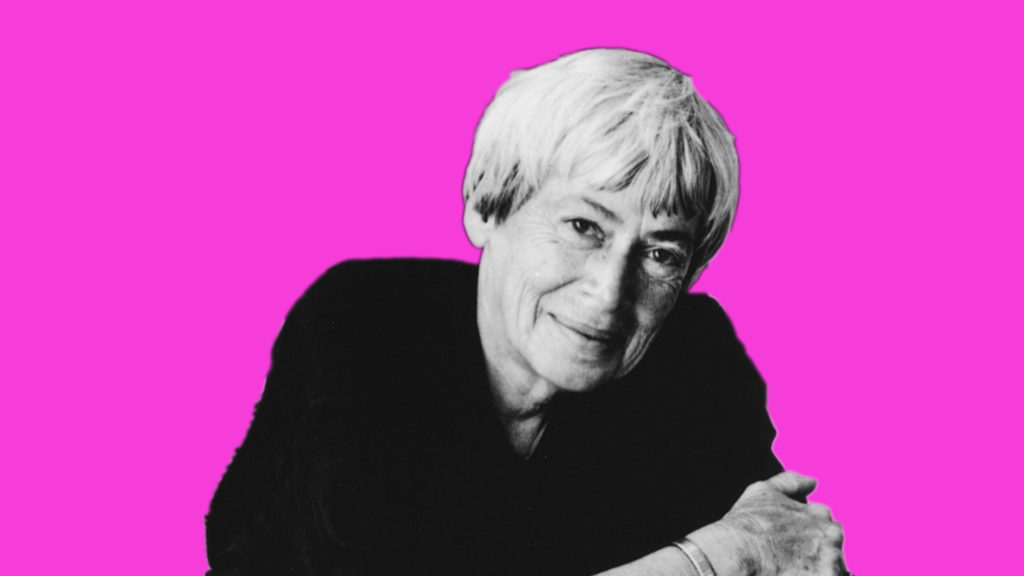“All of us have to learn how to invent our lives, make them up, imagine them. We need to be taught these skills; we need guides to show us how. If we don’t, our lives get made up for us by other people.” —Ursula K. Le Guin, The Wave in the Mind, 2004.
Ursula K. Le Guin was one of the first science-fiction writers I read. I was in college at the time, breathing the heady air of second wave feminism, when a book clerk handed me The Left Hand of Darkness. Since then, I’ve heard many other readers say the same thing I felt: that book took the top of my head right off.
There was more Le Guin to read after that. I’ve been reading her all of my adult life. I read her before I thought of writing myself, and I read her after. I read her for pleasure, and I read her for comfort, and I read her for guidance, wisdom, and inspiration. I read her for poetic leaps and for scholarly discourse. I read her to spend time in the many incredible worlds she created.
And then I was lucky enough to get to know her personally.
I can’t possibly provide a complete list of what she taught me, by word and example. But here is my starter list. Feel free to add and revise to make your own.
In no particular order:
1. There is no reason a book of ideas can’t also be deeply moving, gorgeously written, and inhabited by people who take rooms in your heart and never move out.
2. There is no reason a married woman with children can’t also be a committed artist. (This seems self-evident now but wasn’t immediately clear to me.)
3. Write what you want to write. Add as many dragons as you like.
4. You can regret a decision you made in an earlier book and correct it in a later work. (This is a hard one in our unforgiving times, when your previous missteps are eternal and only a google away. But there is nothing shameful in becoming a better person, a wiser person. Done right, it’s pretty heroic.)
5. The values of patriarchy are buried in the very plots of our stories. New plots are needed.
6. Other writers are not your competition. They are your sustenance. Writing is joyous, but never as joyous as reading.
7. Speak up for the books, poems, shows, music, and paintings you love even though you sound smarter and more discerning when you can’t be pleased.
8. There is no reason why your next book can’t be your best yet, no matter how old you are allowed to become.
9. But also, your next book needn’t be your best yet. You could save that for the next next book.
10. And finally—immortality has never worked out well for anyone. Avoid it at all costs.
Ursula was one of the most noticing people I’ve ever met. She was tuned in to the world in small ways (she always noticed birdsong) and large. In 2014, at the National Book Awards, she warned us that bad times were coming and that we’d all have to work to “imagine some real grounds for hope.”
But providing plausible hope was always her job. No one else will ever do it as beautifully, as honestly, as sharply, as surprisingly, and as brilliantly as she did. Everywhere I go on the internet today, people are mourning. We know what we had and we know what we’ve lost.
Rest in peace, dear Ursula. I feel the last words here should be yours:
“If you can see a thing whole,” he said, “it seems that it’s always beautiful. Planets, lives. . . . But close up, a world’s all dirt and rocks. And day to day, life’s a hard job, you get tired, you loose the pattern. You need distance, interval. The way to see how beautiful earth is, is to see it from the moon. The way to see how beautiful life is, is from the vantage point of death.” — Ursula K Le Guin, The Dispossessed, 1974
Karen Joy Fowler is the author of six novels, including The Jane Austen Book Club and We Are All Completely Beside Ourselves, and three short story collections. She has been the recipient of a PEN/Faulkner Award and short-listed for the Man Booker Prize.
from The Paris Review http://ift.tt/2E81cuX

Comments
Post a Comment